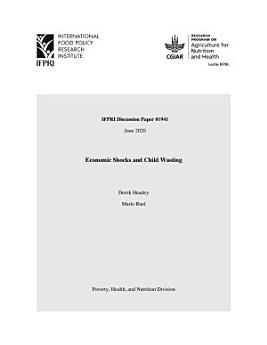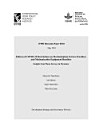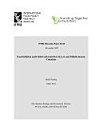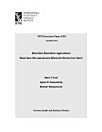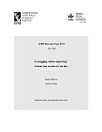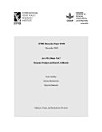Economic shocks and child wasting
Headey, Derek D. · Ruel, Marie T.
IFPRI Discussion Paper Aklat 1 · Intl Food Policy Res Inst
E-book
37
Mga Page
family_home
Kwalipikado
info
reportHindi na-verify ang mga rating at review Matuto Pa
Tungkol sa ebook na ito
In developing countries macroeconomic volatility is common, and severe negative economic shocks can substantially increase poverty and food insecurity. Less well understood are the implications of these contractions for child acute malnutrition (wasting), a major risk factor for under-5 mortality. This study explores the nutritional impacts of growth shocks over 1990-2018 by linking wasting outcomes collected for 1.256 million children from 52 countries to lagged annual changes in national income. Difference-in-difference estimates suggest that a 10% annual decline in national income increases moderate/severe (WHZ<-2) and severe wasting (WHZ<-3) by 14 and 22 percent. An exploration of possible mechanisms suggests negative economic shocks increase risks of diarrhea, fever, and maternal underweight prevalence, and reduce child dietary diversity. Applying these results to the predicted economic impacts of COVID-19 suggests that millions of pre-school children are at increased risk of wasting and wasting-related morbidity and mortality unless urgent preventative action is taken.
I-rate ang e-book na ito
Ipalaam sa amin ang iyong opinyon.
Impormasyon sa pagbabasa
Mga smartphone at tablet
I-install ang Google Play Books app para sa Android at iPad/iPhone. Awtomatiko itong nagsi-sync sa account mo at nagbibigay-daan sa iyong magbasa online o offline nasaan ka man.
Mga laptop at computer
Maaari kang makinig sa mga audiobook na binili sa Google Play gamit ang web browser ng iyong computer.
Mga eReader at iba pang mga device
Para magbasa tungkol sa mga e-ink device gaya ng mga Kobo eReader, kakailanganin mong mag-download ng file at ilipat ito sa iyong device. Sundin ang mga detalyadong tagubilin sa Help Center para mailipat ang mga file sa mga sinusuportahang eReader.
